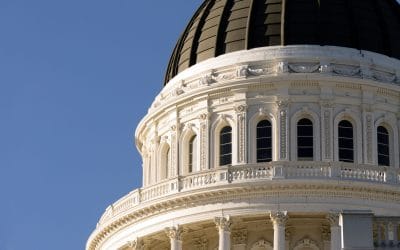The 2025 legislative session focused heavily on budget stability and accountability within a slower-revenue environment. The Governor signed a series of major budget and trailer bills shaping education finance and operations for the 2025–26 fiscal year.
The centerpiece is AB 121 (Education Omnibus Trailer Bill), which sets the Proposition 98 Guarantee at $114.6 billion, fully funds the Local Control Funding Formula (LCFF) with a 2.30% COLA, and delivers significant new investments in literacy, teacher development, and career education. Key allocations include $1.7 billion for the Student Support and Professional Learning Grant to help schools address rising costs, $215 million for literacy coaches, an additional $150 million for CTE and career pathways, and an additional $160 million to support the implementation universal school meals. The bill also strengthens budget oversight and LCAP compliance, enforces fiscal penalties for late adoption, and provides wildfire relief for affected local educational agencies (LEAs).
Complementing that, SB 101 (Budget Act of 2025) establishes the overall $321.1 billion state budget, including maintaining Proposition 98 funding stability and expanding total funding for the Expanded Learning Opportunities Program ($4.5 billion). Together, AB 121 and SB 101 ensure steady TK–12 funding growth despite projected fiscal headwinds.
SB 147 (Education Finance Trailer Bill Clean-Up) fine-tunes implementation of several new programs, including aligning timelines for literacy professional development grants, expanding student teacher stipend funding, and clarifies that non-teacher interns are eligible for the Golden State Teacher Grant Program.
SB 595 (Choi, R-Irvine) modernizes local investment and financial reporting laws, tightening timelines for required reports to the State Controller and extending investment flexibility for local agencies, changes that will affect county treasurers and district business officials managing pooled funds.
Finally, SB 663 (Allen, D-Santa Monica), while not directly changing education programs, provides critical property tax relief for communities affected by the 2025 Los Angeles and Ventura County wildfires, ensuring that local schools in those regions are held harmless through state backfills under Proposition 98.
The Governor signed the following school finance bills:
School Finance
- AB 100 (Gabriel) – Budget Acts of 2023 and 2024.
This bill alters the Budget Act of 2023 and the Budget Act of 2024 by amending and adding items of appropriation and making other changes. This bill took effect immediately upon signature by the Governor as a Budget Bill.
Chapter 2, Statutes of 2025 - AB 102 (Gabriel) – Budget Act of 2025.
This measure changes the Budget Act of 2025 by amending, adding, and repealing items of appropriation and making other changes. This bill took effect immediately upon signature by the Governor as a Budget Bill.
Chapter 5, Statutes of 2025 - AB 118 (Committee on Budget) – Human services.
This bill is a budget trailer bill implementing several human services provisions from the 2025–26 Budget Act that indirectly affect county offices of education and district partners involved in juvenile justice, child welfare, and social service coordination. The bill revises the Juvenile Justice Realignment Block Grant formula beginning in 2026–27, shifting funding to emphasize youth served in less restrictive, community-based programs and prohibiting allocations to any county operating juvenile facilities deemed “unsuitable” for confinement. Among other things, it requires counties to include detailed expenditure summaries and descriptions of their reentry and alternative programs in annual block grant plans. The measure also mandates child and family team meetings for children receiving family maintenance services, an important change for district liaisons who coordinate with social workers under foster youth or family support programs. For the CalWORKs program, counties must provide pre-populated semiannual renewal forms to participants, streamlining parent reporting and enrollment processes. AB 118 also tightens rules on Adoption Assistance Program (AAP) payments for out-of-state residential treatment facilities, limiting use to qualified, licensed programs and requiring annual reporting by county adoption agencies. The bill appropriates $208.8 million for juvenile justice realignment and clarifies funding responsibilities between the state and counties under federal in-home support compliance rules.
Chapter 7, Statutes of 2025 - AB 121 (Committee on Budget) – Education finance: education omnibus budget trailer bill.
This measure is the 2025 Education Omnibus Budget Trailer Bill, enacting the TK–14 components of the state budget and setting the Proposition 98 Guarantee at $114.6 billion for 2025–26. It fully funds the Local Control Funding Formula with a 2.3% COLA and provides major one-time investments, including $1.7 billion for a Student Support and Professional Development Block Grant, $215 million for Literacy Coaches and Reading Specialists, and $200 million for evidence-based literacy training. The bill allocates $150 million for CTE and career pathways, $160 million for universal school meals implementation, and $300 million for student teacher stipends. It strengthens district and county budget oversight processes, imposes fiscal penalties for failing to adopt timely LCAPs, and streamlines audit extensions, among other things. It also provides wildfire relief for LEAs impacted by the 2025 Los Angeles fires, including attendance and property tax protections.
Chapter 8, Statutes of 2025 - AB 123 Higher education budget trailer bill.
This bill is the 2025 Higher Education Budget Trailer Bill, implementing the college and university provisions of the 2025–26 state budget. It funds new UC student housing construction at UC Davis and UC Santa Barbara and extends multiple higher education programs, including the Golden State Teacher Grant, Rising Scholars, and Native American Student Success initiatives. The bill requires the UC and CSU systems to begin developing a uniform set of academic standards for dual enrollment and college-credit coursework beginning in October 2025, promoting smoother K–16 alignment. It establishes the California Career Passport Program, administered by the California Community Colleges Chancellor’s Office, to create a digital record of students’ academic progress, employment preparation, and credit for prior learning, funded at $25 million. AB 123 also provides new funding for community colleges, including $60 million for a Student Support Block Grant, $20 million for emergency financial aid, $15 million for Dreamer Resource Liaisons, and $10 million each for healthy school food and firefighter training programs. It supports workforce recovery in regions affected by the Palisades and Eaton fires and continues the Credit for Prior Learning Initiative with up to $15 million in funding.
Chapter 9, Statutes of 2025 - AB 1438 (Gallagher) – School finance: administrative employee-to-teacher ratio: Paradise Unified School District.
This measure grants the Paradise Unified School District (PUSD) a three-year exemption, from fiscal years 2024–25 through 2026–27, from state penalties tied to exceeding the statutory administrative employee-to-teacher ratio. The bill acknowledges the district’s ongoing recovery from the 2018 Camp Fire, which destroyed most of its facilities and led to steep enrollment declines, forcing the district to operate with higher administrative staffing levels as schools reopen. Without this relief, PUSD would face penalties exceeding $245,000 per year, diverting resources from rebuilding efforts. The measure requires PUSD to submit a detailed report by September 1, 2026, to the California Department of Education, the Department of Finance, and legislative committees documenting its staffing ratios, reasons for noncompliance, student impact, and progress toward meeting state standards by 2026–27. The bill is an urgency statute, ensuring uninterrupted state funding during the district’s recovery period.
Chapter 193, Statutes of 2025 - SB 101 (Wiener) – Budget Act of 2025.
This bill enacts California’s 2025–26 State Budget, a $324.7 billion spending plan that preserves education stability despite slower state revenue growth assumptions. The budget continues targeted investments in literacy, teacher training, and extended learning, reinforcing the state’s post-pandemic recovery strategy. For higher education, the budget restores prior UC and CSU base funding reductions, funds enrollment growth, and provides new one-time investments in student housing, CalBRIDGE research fellowships, and local journalism programs. Community colleges receive additional support through COLA adjustments, workforce development funds, and aid for apprenticeship and career pathway programs.
Chapter 4, Statutes of 2025 - SB 120 (Committee on Budget and Fiscal Review) – Early childhood education and childcare.
This measure is the 2025–26 early childhood education and childcare budget trailer bill, implementing key policy and funding changes from the state budget. The bill suspends the cost-of-living adjustment (COLA) for childcare and preschool programs in 2025–26 but guarantees annual COLAs beginning July 1, 2026. It shifts all subsidized childcare and preschool programs, both direct contract and voucher-based, to reimbursement based on enrollment and families’ certified need, a change aimed at stabilizing provider funding. SB 120 directs the California Department of Social Services (CDSS) to report quarterly to the Legislature through July 2027 on implementation progress for rate reform and prospective payment systems. The bill sets legislative intent to replace the regional market rate system with a new cost-based rate model that reflects program quality, geography, and regulatory differences, ensuring equity across settings. It extends the “cost of care plus” monthly rate increases for all subsidized providers and links future increases to the statutory COLA formula. The measure also ensures that collective bargaining agreements with Child Care Providers United take precedence if any conflicts arise. Finally, SB 120 appropriates $88.55 million from the General Fund to CDSS to support the transition to the new reimbursement model.
Chapter 13, Statutes of 2025 - SB 147 (Committee on Budget and Fiscal Review) – Education finance: education omnibus trailer bill.
This bill is the 2025–26 K–12 Education Omnibus Trailer Bill, which makes the statutory changes needed to implement education provisions of the state budget. The bill refines implementation of several high-profile initiatives, including adjustments to the Literacy Instruction Professional Development Grants, aligning expenditure and reporting deadlines for smoother district compliance. It authorizes the CDE to charge modest fees to non-LEA organizations that submit literacy professional development programs for state approval, ensuring cost recovery for administrative review. SB 147 also increases funding for the Student Teacher Stipend Program’s media campaign and grant management system from $5 million to $6 million, expanding outreach and administrative capacity. It clarifies that the Individualized Education Program (IEP) template must be translated into the top ten non-English languages in California and made available online, a move aimed at improving accessibility for families of students with disabilities. In addition, the bill explicitly extends eligibility for the Golden State Teacher Grant Program to include non-teacher interns, broadening access to aspiring educators in specialized or classified roles.
Chapter 744, Statutes of 2025 - SB 151 (Committee on Budget and Fiscal Review) – Early childhood education and childcare.
This bill would extend the period in which reimbursement of state-subsidized childcare and development providers, license-exempt providers, and California state preschool family childcare home education network providers is based on the maximum authorized or certified hours of care to July 1, 2028.
Chapter 108, Statutes of 2025 - SB 595 (Choi) – Local government: investments and financial reports.
This measure updates state laws governing local government financial reporting and investment practices, with implications for county offices of education and school districts that manage local investment pools or fiscal records. The bill revises the deadline for filing annual financial transaction reports with the State Controller’s Office (SCO), allowing penalties if reports are not submitted within 10 months after the end of the fiscal year, instead of 20 days after notification. This aims to address widespread late filings, as more than 1,000 agencies failed to report on time in 2022–23. SB 595 also extends until 2026 key investment provisions that allow local agencies with over $100 million in assets to hold a larger share of their surplus funds (up to 40%) in commercial paper and permits investment in securities that may yield zero or negative interest during certain market conditions. Importantly, the bill extends the maximum maturity for commercial paper from 270 to 397 days, providing greater flexibility and alignment with federal standards for qualified institutional investors. These changes are intended to modernize local investment practices while maintaining safeguards for risk management and transparency. The measure also clarifies that the SCO may extend financial reporting deadlines for local agencies under extenuating circumstances.
Chapter 323, Statutes of 2025 - SB 663 (Allen) – Winter Fires of 2025: real property tax: exemptions and reassessment.
This bill provides urgent property tax relief for homeowners, nonprofits, and disabled veterans impacted by the 2025 Los Angeles and Ventura County wildfires, as well as the 2024 Mountain and Franklin fires. The bill allows affected property owners up to 24 months (instead of 12) to file disaster reassessment claims and extends the five-year rebuilding deadline to eight years for retaining base-year property tax values, giving victims more time to reconstruct destroyed homes and facilities. It directs county assessors to continue recognizing welfare exemptions for churches, nonprofits, and similar entities whose properties were destroyed, as long as owners show intent and progress toward rebuilding by December 31, 2033. The bill also clarifies that under the disabled veterans’ exemption, a veteran’s destroyed residence will continue to qualify as their principal residence during reconstruction if ownership and intent to rebuild are maintained. SB 663 grants assessors flexibility to determine the official date of property damage for disaster reassessment purposes, reducing bureaucratic delays. It applies similar protections to both residential and nonprofit properties and codifies that these provisions apply to disasters for which the Governor proclaimed a state of emergency. While the measure may reduce local property tax revenue by an estimated $184 million, the state is expected to backfill the education share under Proposition 98.
Chapter 549, Statutes of 2025
Charter Schools
- SB 631 (Richardson) – Charter School Revolving Loan Fund.
This bill, among other things, increases the maximum loan amount and the maximum lifetime loan limitation by $250,000 to instead be $500,000. It also revises and recasts the maximum repayment period of a loan, no longer makes the charter school solely liable for repayment of a loan in the event of a default, and revises criteria for receiving priority in the granting of loans. The bill requires moneys in the fund to instead be loaned at the interest rate described above or at a rate equal to 50% of the interest rate paid by the state on the most recent sale of state general obligation bonds, whichever is less, except that the bill prohibits the interest rate from being set at a rate lower than 3%.
Chapter 776, Statutes of 2025
Capitol Advisors Group has produced a set of comprehensive client briefs detailing new education laws that were passed by the Legislature and signed into law by Governor Newsom in 2025. Each brief is organized by subject area and includes an executive summary highlighting major changes we think you should know about. Bills signed by the Governor take effect on January 1, 2026, unless the bill specifically states otherwise.




0 Comments